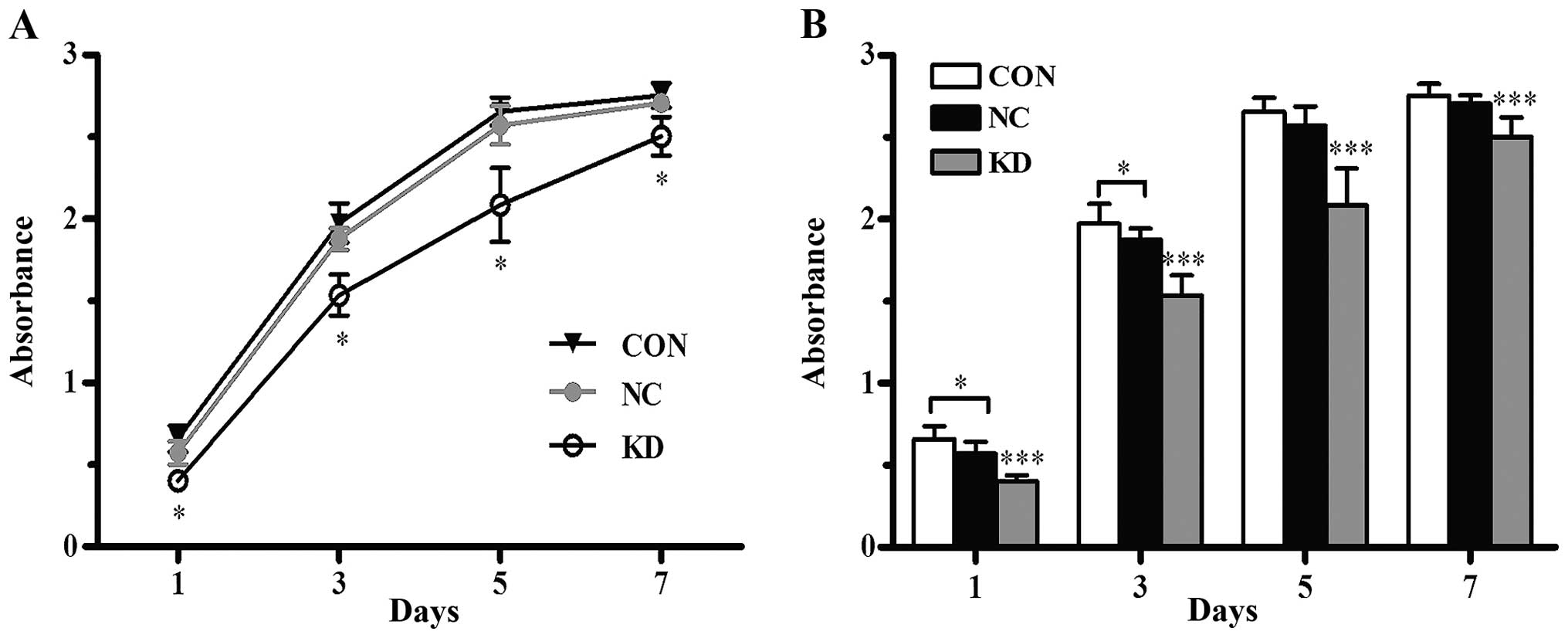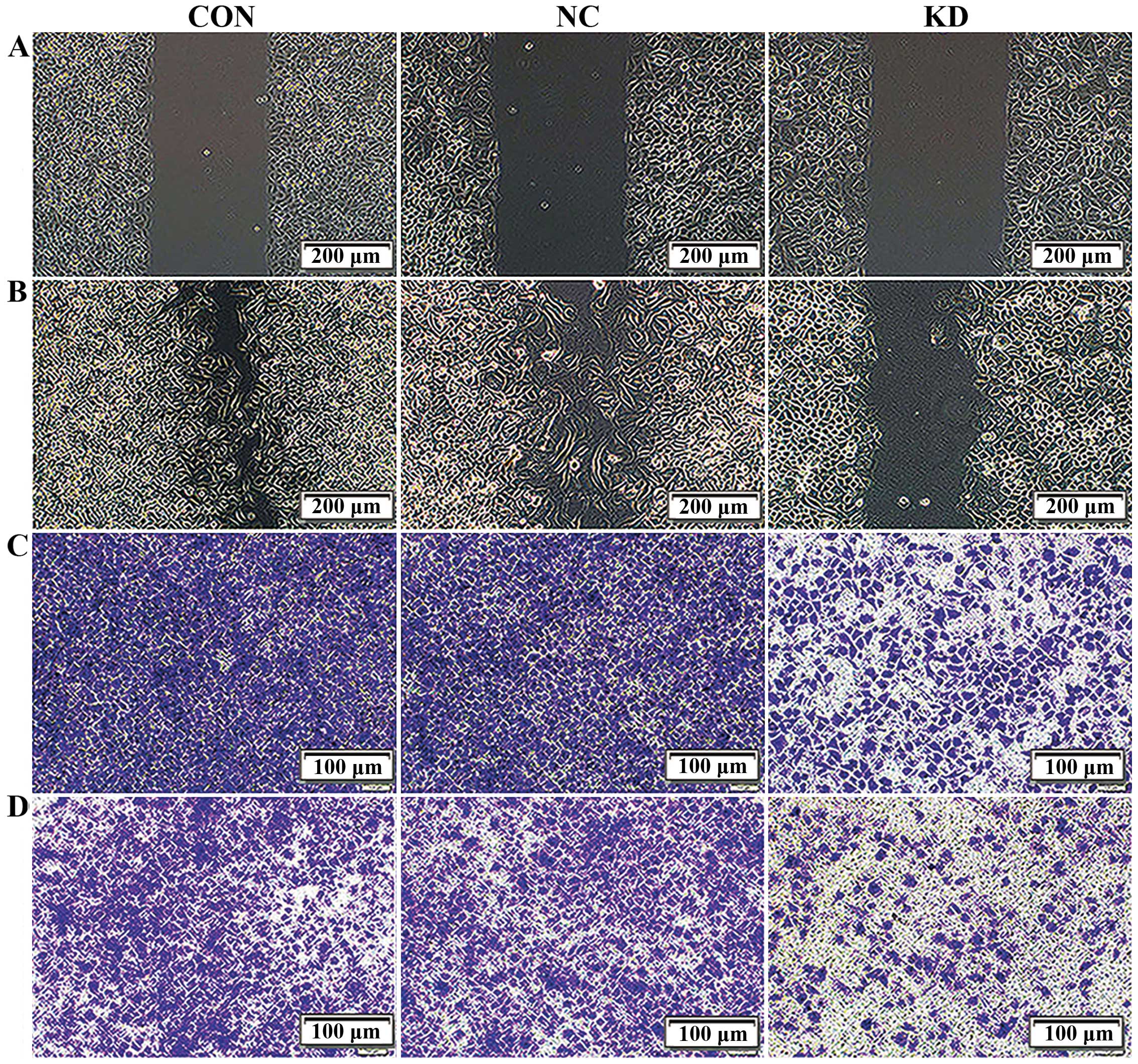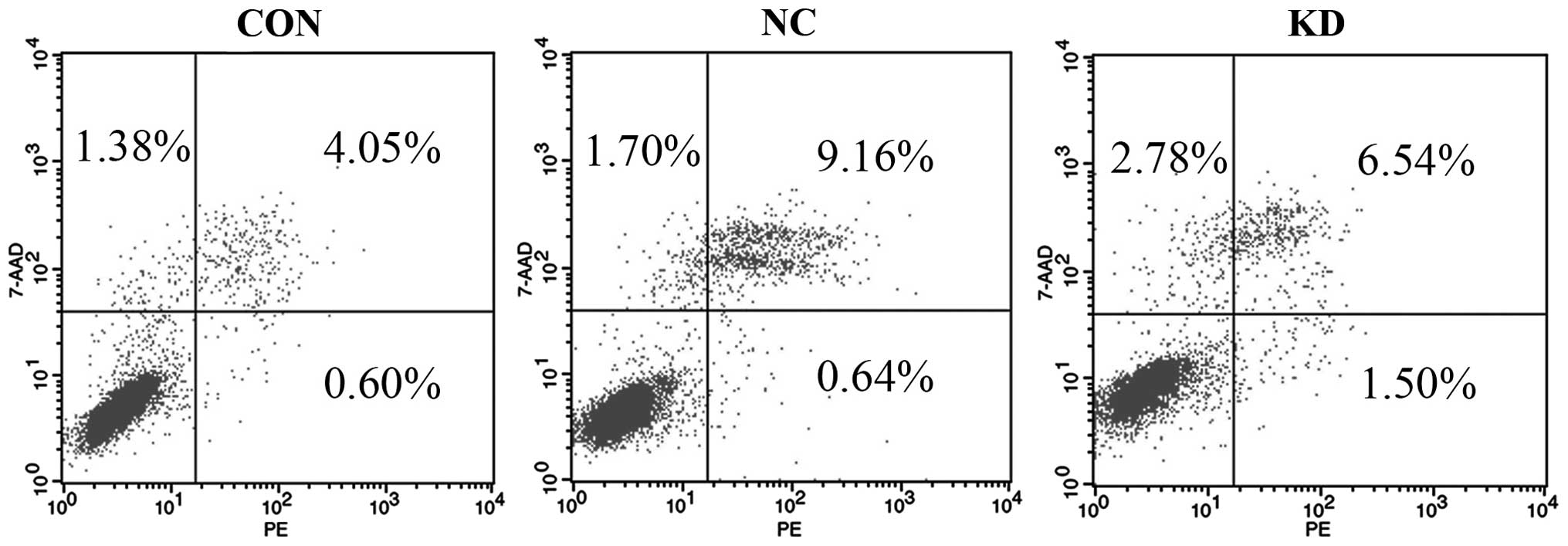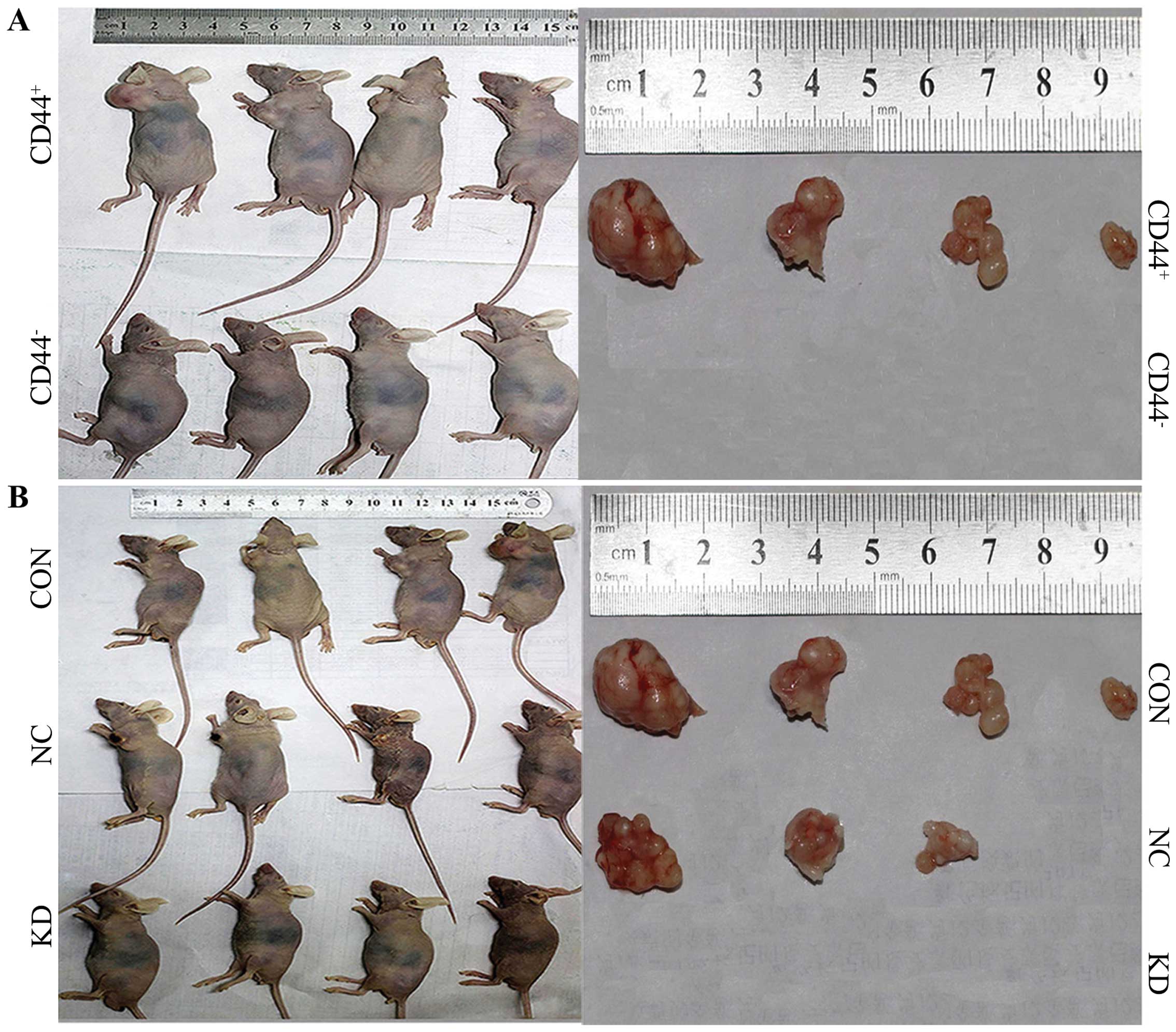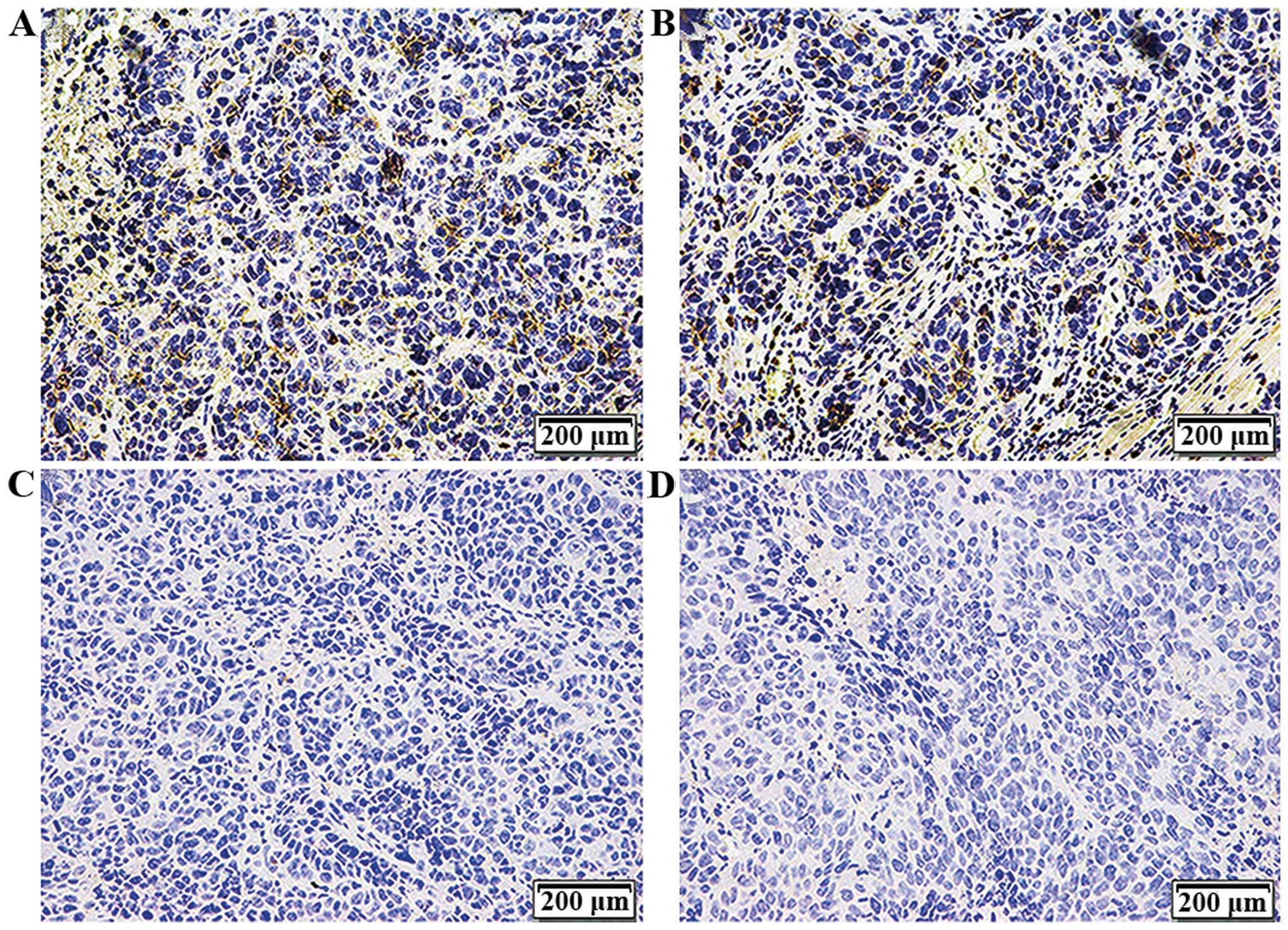|
1
|
Lung ML, Cheung AK, KO JM, Lung HL, Cheng
Y and Dai W: The interplay of host genetic factors and Epstein-Barr
virus in the development of nasopharyngeal carcinoma. Chin J
Cancer. 33:556–568. 2014. View Article : Google Scholar : PubMed/NCBI
|
|
2
|
Adham M, Kurniawan AN, Muhtadi AI, Roezin
A, Hermani B, Gondhowiardjo S, Tan IB and Middeldorp JM:
Nasopharyngeal carcinoma in Indonesia: Epidemiology, incidence,
signs, and symptoms at presentation. Chin J Cancer. 31:185–196.
2012. View Article : Google Scholar : PubMed/NCBI
|
|
3
|
Lee AW, Lin JC and Ng WT: Current
management of nasopharyngeal cancer. Semin Radiat Oncol.
22:233–244. 2012. View Article : Google Scholar : PubMed/NCBI
|
|
4
|
Jemal A, Bray F, Center MM, Ferlay J, Ward
E and Forman D: Global cancer statistics. CA Cancer J Clin.
61:69–90. 2011. View Article : Google Scholar : PubMed/NCBI
|
|
5
|
Li R, Wu X, Wei H and Tian S:
Characterization of side population cells isolated from the gastric
cancer cell line SGC-7901. Oncol Lett. 5:877–883. 2013.PubMed/NCBI
|
|
6
|
Wang S, Xu ZY, Wang LF and Su W:
CD133+ cancer stem cells in lung cancer. Front Biosci
(Landmark Ed). 18:447–453. 2013. View
Article : Google Scholar
|
|
7
|
Cufi S, Corominas-Faja B, Vazquez-Martin
A, Oliveras-Ferraros C, Dorca J, Bosch-Barrera J, Martin-Castillo B
and Menendez JA: Metformin-induced preferential killing of breast
cancer initiating CD44+CD24−/low cells is
sufficient to overcome primary resistance to trastuzumab in
HER2+ human breast cancer xenografts. Oncotarget.
3:395–398. 2012. View Article : Google Scholar : PubMed/NCBI
|
|
8
|
Meng E, Long B, Sullivan P, McClellan S,
Finan MA, Reed E, Shevde L and Rocconi RP:
CD44+/CD24− ovarian cancer cells demonstrate
cancer stem cell properties and correlate to survival. Clin Exp
Metastasis. 29:939–948. 2012. View Article : Google Scholar : PubMed/NCBI
|
|
9
|
Vasuri F, Resta L, Fittipaldi S, Malvi D
and Pasquinelli G: RUNX-1 and CD44 as markers of resident stem cell
derivation in undifferentiated intimal sarcoma of pulmonary artery.
Histopathology. 61:737–743. 2012.PubMed/NCBI
|
|
10
|
Dhingra S, Feng W, Brown RE, Zhou Z,
Khoury T, Zhang R and Tan D: Clinicopathologic significance of
putative stem cell markers, CD44 and nestin, in gastric
adenocarcinoma. Int J Clin Exp Pathol. 4:733–741. 2011.PubMed/NCBI
|
|
11
|
Rao GH, Liu HM, Li BW, Hao JJ, Yang YL,
Wang MR, Wang XH, Wang J, Jin HJ, Du L, et al: Establishment of a
human colorectal cancer cell line P6C with stem cell properties and
resistance to chemotherapeutic drugs. Acta Pharmacol Sin.
34:793–804. 2013. View Article : Google Scholar : PubMed/NCBI
|
|
12
|
Shang Z, Cai Q, Zhang M, Zhu S, Ma Y, Sun
L, Jiang N, Tian J, Niu X, Chen J, et al: A switch from
CD44+ cell to EMT cell drives the metastasis of prostate
cancer. Oncotarget. 6:1202–1216. 2015. View Article : Google Scholar
|
|
13
|
Prince ME, Sivanandan R, Kaczorowski A,
Wolf GT, Kaplan MJ, Dalerba P, Weissman IL, Clarke MF and Ailles
LE: Identification of a subpopulation of cells with cancer stem
cell properties in head and neck squamous cell carcinoma. Proc Natl
Acad Sci USA. 104:973–978. 2007. View Article : Google Scholar : PubMed/NCBI
|
|
14
|
Shigeishi H, Biddle A, Gammon L, Emich H,
Rodini CO, Gemenetzidis E, Fazil B, Sugiyama M, Kamata N and
Mackenzie IC: Maintenance of stem cell self-renewal in head and
neck cancers requires actions of GSK3β influenced by CD44 and
RHAMM. Stem Cells. 31:2073–2083. 2013. View Article : Google Scholar : PubMed/NCBI
|
|
15
|
Su J, Xu XH, Huang Q, Lu MQ, Li DJ, Xue F,
Yi F, Ren JH and Wu YP: Identification of cancer stem-like
CD44+ cells in human nasopharyngeal carcinoma cell line.
Arch Med Res. 42:15–21. 2011. View Article : Google Scholar : PubMed/NCBI
|
|
16
|
Lun SW, Cheung ST, Cheung PF, To KF, Woo
JK, Choy KW, Chow C, Cheung CC, Chung GT, Cheng AS, et al:
CD44+ cancer stem-like cells in EBV-associated
nasopharyngeal carcinoma. PLoS One. 7:e524262012. View Article : Google Scholar
|
|
17
|
Janisiewicz AM, Shin JH, Murillo-Sauca O,
Kwok S, Le QT, Kong C, Kaplan MJ and Sunwoo JB: CD44(+) cells have
cancer stem cell-like properties in nasopharyngeal carcinoma. Int
Forum Allergy Rhinol. 2:465–470. 2012. View Article : Google Scholar : PubMed/NCBI
|
|
18
|
Siemens H, Jackstadt R, Kaller M and
Hermeking H: Repression of c-Kit by p53 is mediated by miR-34 and
is associated with reduced chemoresistance, migration and stemness.
Oncotarget. 4:1399–1415. 2013. View Article : Google Scholar : PubMed/NCBI
|
|
19
|
Tong YQ, Liu B, Zheng HY, He YJ, Gu J, Li
F and Li Y: Overexpression of BMI-1 is associated with poor
prognosis in cervical cancer. Asia Pac J Clin Oncol. 8:e55–e62.
2012. View Article : Google Scholar : PubMed/NCBI
|
|
20
|
Bhattacharyya J, Mihara K, Ohtsubo M,
Yasunaga S, Takei Y, Yanagihara K, Sakai A, Hoshi M, Takihara Y and
Kimura A: Overexpression of BMI-1 correlates with drug resistance
in B-cell lymphoma cells through the stabilization of survivin
expression. Cancer Sci. 103:34–41. 2012. View Article : Google Scholar
|
|
21
|
Wu J, Hu D, Yang G, Zhou J, Yang C, Gao Y
and Zhu Z: Down-regulation of BMI-1 cooperates with artemisinin on
growth inhibition of nasopharyngeal carcinoma cells. J Cell
Biochem. 112:1938–1948. 2011. View Article : Google Scholar : PubMed/NCBI
|
|
22
|
Lu H, Sun HZ, Li H and Cong M: The
clinicopathological significance of Bmi-1 expression in
pathogenesis and progression of gastric carcinomas. Asian Pac J
Cancer Prev. 13:3437–3441. 2012. View Article : Google Scholar : PubMed/NCBI
|
|
23
|
Xu XH, Liu XY, Su J, Li DJ, Huang Q, Lu
MQ, Yi F, Ren JH and Chen WH: shRNA targeting Bmi-1 sensitizes
CD44+ nasopharyngeal cancer stem-like cells to
radiotherapy. Oncol Rep. 32:764–770. 2014.PubMed/NCBI
|
|
24
|
Manoranjan B, Wang X, Hallett RM,
Venugopal C, Mack SC, McFarlane N, Nolte SM, Scheinemann K,
Gunnarsson T, Hassell JA, et al: FoxG1 interacts with Bmi1 to
regulate self-renewal and tumorigenicity of medulloblastoma stem
cells. Stem Cells. 31:1266–1277. 2013. View Article : Google Scholar : PubMed/NCBI
|
|
25
|
Lukacs RU, Memarzadeh S, Wu H and Witte
ON: Bmi-1 is a crucial regulator of prostate stem cell self-renewal
and malignant transformation. Cell Stem Cell. 7:682–693. 2010.
View Article : Google Scholar : PubMed/NCBI
|
|
26
|
Proctor E, Waghray M, Lee CJ, Heidt DG,
Yalamanchili M, Li C, Bednar F and Simeone DM: Bmi1 enhances
tumorigenicity and cancer stem cell function in pancreatic
adenocarcinoma. PLoS One. 8:e558202013. View Article : Google Scholar : PubMed/NCBI
|
|
27
|
Yao X, Wang X, Zhang S and Zhu H: Effects
of Bmi-1 RNAi gene on laryngeal carcinoma Hep-2 cells. Lin Chung Er
Bi Yan Hou Tou Jing Wai Ke Za Zhi. 26:550–557. 2012.In Chinese.
|
|
28
|
Chen YC, Chang CJ, Hsu HS, Chen YW, Tai
LK, Tseng LM, Chiou GY, Chang SC, Kao SY, Chiou SH, et al:
Inhibition of tumorigenicity and enhancement of
radiochemosensitivity in head and neck squamous cell cancer-derived
ALDH1-positive cells by knockdown of Bmi-1. Oral Oncol. 46:158–165.
2010. View Article : Google Scholar
|
|
29
|
Park IK, Qian D, Kiel M, Becker MW,
Pihalja M, Weissman IL, Morrison SJ and Clarke MF: Bmi-1 is
required for maintenance of adult self-renewing haematopoietic stem
cells. Nature. 423:302–305. 2003. View Article : Google Scholar : PubMed/NCBI
|
|
30
|
Jiang Y, Su B, Meng X, Liu C, Liu B, Liu
D, Fan Y and Yang H: Effect of siRNA-mediated silencing of Bmi-1
gene expression on HeLa cells. Cancer Sci. 101:379–386. 2010.
View Article : Google Scholar
|
|
31
|
Zhu D, Wan X, Huang H, Chen X, Liang W,
Zhao F, Lin T, Han J and Xie W: Knockdown of Bmi1 inhibits the
stemness properties and tumorigenicity of human bladder cancer stem
cell-like side population cells. Oncol Rep. 31:727–736. 2014.
|
|
32
|
Xu Z, Liu H, Lv X, Liu Y, Li S and Li H:
Knockdown of the Bmi-1 oncogene inhibits cell proliferation and
induces cell apoptosis and is involved in the decrease of Akt
phosphorylation in the human breast carcinoma cell line MCF-7.
Oncol Rep. 25:409–418. 2011.
|
|
33
|
Chen F, Li Y, Wang L and Hu L: Knockdown
of BMI-1 causes cell-cycle arrest and derepresses
p16INK4a, HOXA9 and HOXC13 mRNA expression in HeLa
cells. Med Oncol. 28:1201–1209. 2011. View Article : Google Scholar
|
|
34
|
Qin L, Zhang X, Zhang L, Feng Y, Weng GX,
Li MZ, Kong QL, Qian CN, Zeng YX, Zeng MS, et al: Downregulation of
BMI-1 enhances 5-fluorouracil-induced apoptosis in nasopharyngeal
carcinoma cells. Biochem Biophys Res Commun. 371:531–535. 2008.
View Article : Google Scholar : PubMed/NCBI
|
|
35
|
Jiang L, Song L, Wu J, Yang Y, Zhu X, Hu
B, Cheng SY and Li M: Bmi-1 promotes glioma angiogenesis by
activating NF-κB signaling. PLoS One. 8:e555272013. View Article : Google Scholar
|
|
36
|
Lindström MS, Klangby U and Wiman KG:
p14ARF homozygous deletion or MDM2 overexpression in
Burkitt lymphoma lines carrying wild type p53. Oncogene.
20:2171–2177. 2001. View Article : Google Scholar
|
|
37
|
Molofsky AV, Pardal R, Iwashita T, Park
IK, Clarke MF and Morrison SJ: Bmi-1 dependence distinguishes
neural stem cell self-renewal from progenitor proliferation.
Nature. 425:962–967. 2003. View Article : Google Scholar : PubMed/NCBI
|
|
38
|
Biehs B, Hu JK, Strauli NB, Sangiorgi E,
Jung H, Heber RP, Ho S, Goodwin AF, Dasen JS, Capecchi MR, et al:
BMI1 represses Ink4a/Arf and Hox genes to regulate stem cells in
the rodent incisor. Nat Cell Biol. 15:846–852. 2013. View Article : Google Scholar : PubMed/NCBI
|
|
39
|
Yoshikawa R, Tsujimura T, Tao L, Kamikonya
N and Fujiwara Y: The oncoprotein and stem cell renewal factor BMI1
associates with poor clinical outcome in oesophageal cancer
patients undergoing preoperative chemoradiotherapy. BMC Cancer.
12:4612012. View Article : Google Scholar : PubMed/NCBI
|
|
40
|
Yao D, Wang Y, Xue L, Wang H, Zhang J and
Zhang X: Different expression pattern and significance of
p14ARF-Mdm2-p53 pathway and Bmi-1 exist between gastric
cardia and distal gastric adenocarcinoma. Hum Pathol. 44:844–851.
2013. View Article : Google Scholar
|















